|
|
|
|
Products mentioned in this Article
--None--
|
|
|
|
|
|
|
|
|
 |
|
|
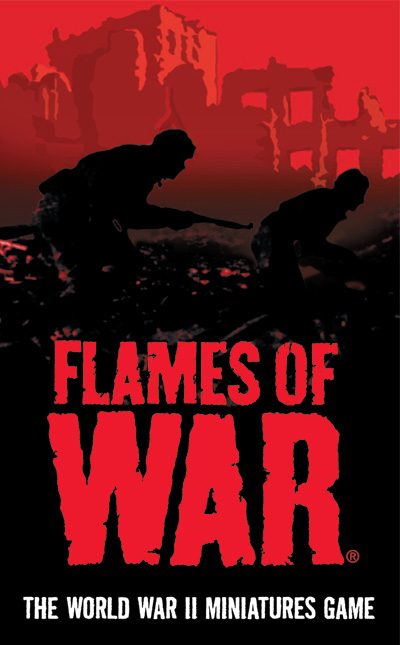 |
Making The Most Of Your Tournament Experience
By Chris Townley
Playing in a tournament can be a fantastic experience where you get to play a group of new people, hopefully make a few new friends and get to check out some great looking armies. It can however be daunting for the novice competitor who finds themselves surrounded by a group of strangers discussing rules, army lists and previous games. By the end of the event though if everything has gone well, you’ll have hopefully won some games and with a bit of luck not lost too many, plus had a great time. Ensuring that you have the best time possible is as much your responsibility as it is anyone else’s.
|
| But there is also a good deal of importance paid to making sure you give your opponents a great gaming experience, likewise you should expect that your opponents are there to give you an equally great time. Over the past few years I’ve taken the time to talk to fellow tournament players of various games and used the opportunity to discuss what has made tournaments more enjoyable for them. These few suggestions that follow may just help
you, and your fellow competitors enjoy the next tournament a little
more, just remember they are only suggestions and in some tournaments
there may be rules or restrictions that will over-rule some of these. |

|
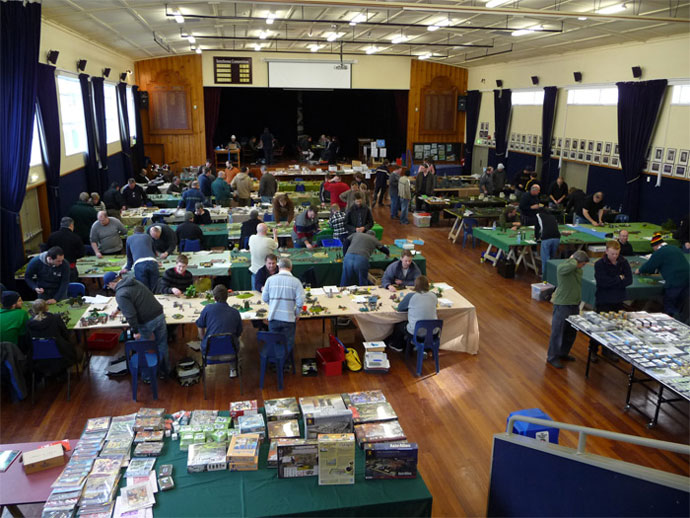 |
The Pre-game and Warm-Up Experience
They say most battles are won or lost before the first shot is fired, and in a tournament your enjoyment can be greatly increased by getting a few items of business out of the way before a single dice is rolled.
The first thing you should do when you arrive at you table, before anything else is greet your opponent. This does not have to be anything more than “Hi, I’m Chris from Auckland and I’m playing a Panzergrenadier army” but it’s nice to have a name to go with the face.
|
Next its good to run through the terrain on the table, sit down and
look at each piece of terrain and decide what effect it has. Is that
hill nothing more than an easy rolling climb or are the sides almost
vertical and therefore difficult ground? It’s up to you how the terrain will work, but it’s best to work out the details before any figures are deployed.
Next comes deployment and explaining your army. Not everyone is lucky enough to have a copy of every Intelligence Briefing; similarly not everyone can remember every weapons stats.
|
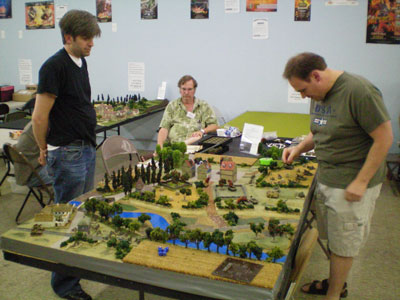 |
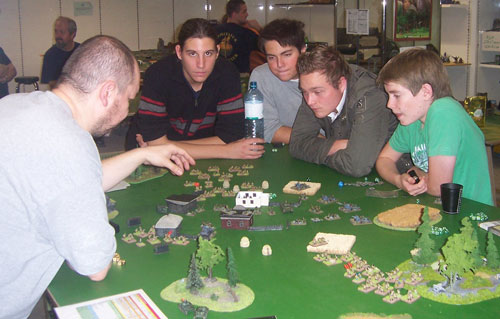 |
Most people will take time to swap army lists
and spend a few minutes reading and asking questions – some special
rules are very tricky and understanding how they work can stop
misunderstandings later on in the game.
Another suggestion is that if you have access to a photocopier then
give your opponents a copy of your list to keep, along with any special
rules or scenarios that you are using (most of which can be downloaded
from this website). You should also have a copy of the rules, your army
list, dice, Intelligence Briefing and anything else you think you will
need. |
The last part of the warm up period is to wish your opponent good luck and even shake hands; a challenging loss is a lot better than winning solely because your opponents dice were not working very well.
When the Dice Fly and the Troops Move
The first thing to remember is that we are playing a game, a great game, but still a game. During the game the dice will not always go your way, units may fail a motivation test and break at the wrong moment or fail to hit a barn door at twenty paces and so on, but that’s part of the fun.
|
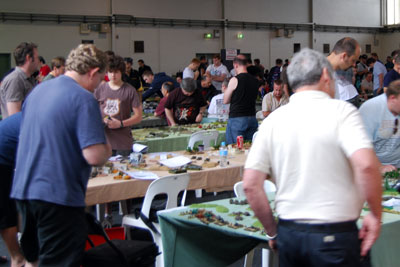 |
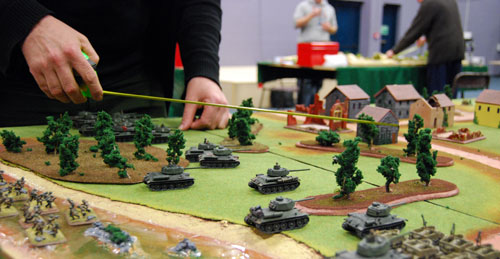 |
If you believe someone is cheating then quietly alert the tournament organisers so they can check it out and perhaps have a word with the person. At the same time be forgiving of those people who forget a rule or maybe interpret it differently from you. Discuss it, read the section in the rules a couple of times and if all else fails ask the players next to you, roll a dice, or call over an umpire. Just remember, we can all read the same rule and come up with different interpretations, find a compromise and get on with the game.
|
Equally don’t be afraid to ask to see your opponents army book if you don’t understand what is going on, and don’t get angry if someone asks you. Maybe your opponent’s regular playing partners play differently, or maybe you have mis-read a rule. It’s no crime and everyone has done it before. At the same time tell your opponent what you are doing that’s special to your army, units that can re-roll tests or move and still shoot at their full rate of fire, and show them the book if necessary.
This also works for dice throws, don’t just grab some dice and begin rolling and at the end of it announce that you have passed all your motivation tests. Go through the units one by one, announce what you need to get and roll. Dice etiquette can also be quite important, generally there will be a flank of the table that is empty so that’s a good place to roll the dice so they are not crashing into figures.
|
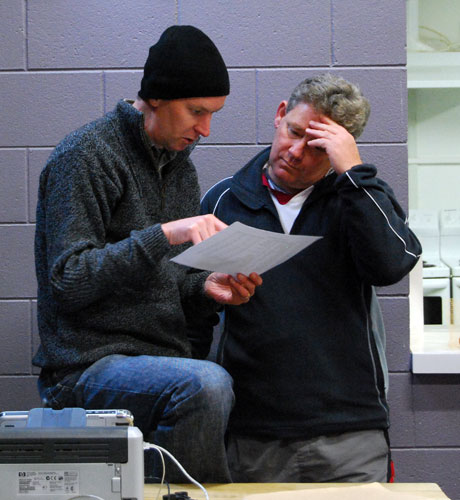 |
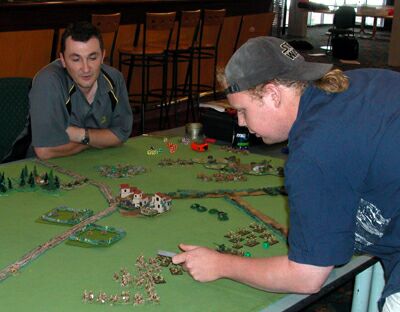 |
It’s also important to remember that these games involve a lot of compromises. Sometimes what looks clear to you may not be clear to another player, like whether a unit can assault another because it’s 0.01mm out. Sometimes you can roll off for it, other times your opponent maybe generous and give you a "gimme".
There is nothing more ungracious than not returning that generosity if a similar, arguable situation arises later in the game.
Also it’s a nice courtesy to let your opponent make the calls on things that affect his troops, like where a template has landed and how many figures it has hit, and the same applies when it’s your troops being pummeled. As long as you are both fair about it the game will flow a lot smoother.
|
The final point is during a tournament is that time becomes a critical factor. Most games only have two to three hours to play out including setting up, discussing lists, playing the game and packing up. Make sure that you spend your time wisely. Plan ahead whilst your opponent is having his turn, where are you going to move, what are you going to shoot at and so on. Finally you should know your army list and rules reasonably well so you don’t have to look everything up all the time. Likewise don’t stretch out your turns and try to “play for time”. This is a good way to annoy your opponent and it will hurt your reputation as a player, better to loose graciously than try to stretch out a draw that you did not deserve.
|
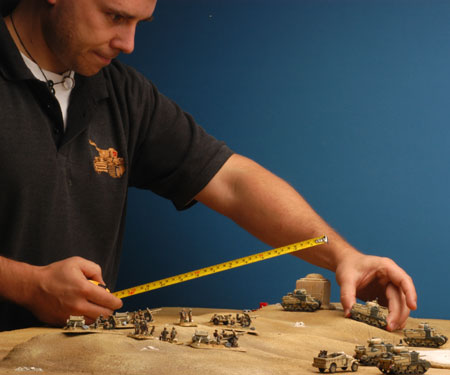 |
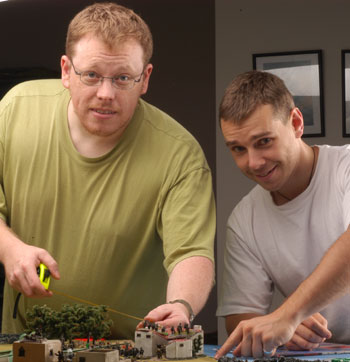 |
When the Carry Cases Come Out, and the Figures Leave the Table
Once the game has been played there still remains a number of important steps to resolve and it’s easy to make even the worst loss a positive experience to learn from just by following a few simple steps.
Firstly, work out who won. Generally this will be fairly apparent as someone probably failed a company motivation test, or achieved their objective. In those occasions where it is not so clear take some time and look through your platoons one by one and confirm how many you have lost and work out the victory points.
The next thing is to take some time to sit down and discuss the game when you are finished. This is to cover any issues that you may have had that you did not resolve during the game and try to find the rules in the book that covers the situation. Compliment your opponent if they played in a good way, or if they played well, positive re-enforcement leads to more positive behavior.
|
|
Once this is done spend a few minutes looking at the sportsmanship, painting and army composition points (if the tournament has these points components) and reflect on the game, the painting and the army. Nobody wins all the time, so don’t be a bad sport and mark your opponent down just because they won. It is important to spend a few moments looking at the guidelines that the organizers have given you. Don’t hand out high scores just because you can, but consider each section fairly and mark it appropriately.
|
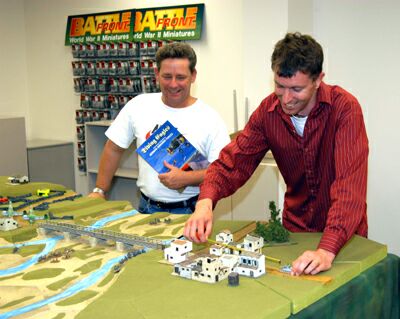
|
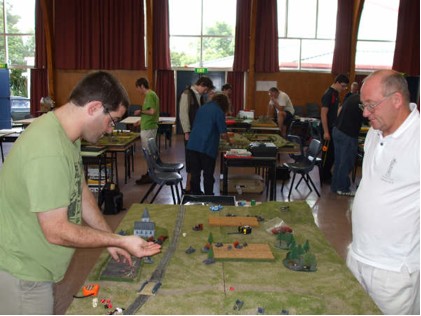 |
However don’t be afraid to give someone a low sports score if you feel it’s deserved. If you are really concerned about another player’s attitude have a chat to the umpires, maybe you caught your opponent on a bad day, or maybe others have complained about them. Likewise a nice looking army deserves a reward as well. Its more fun to play against an army that looks nice or is historically accurate where someone has taken the time to put unit insignias on their tanks and infantry, or putting together a couple of pages of information and pictures on the unit they have chosen to model.
|
Playing in a tournament is a serious investment of time and money, don’t let other people make it a bad experience for you, and don’t make it a bad experience for others. Play some games, have some fun and remember it’s not whether you win or lose, its whether or not you pass your motivation tests.
- Chris
|

|
Last Updated On Wednesday, August 26, 2009 by Blake at Battlefront
|
|
|